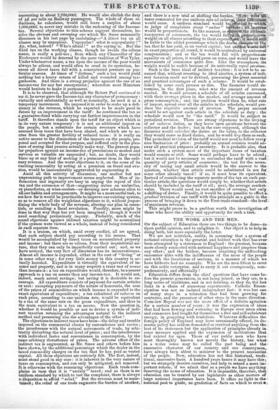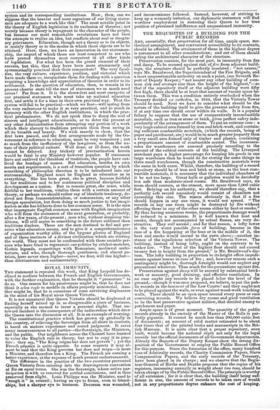THE WORK AND THE MEN.
Or the subject of Education there are two things to be done—to-. ripen public opinion, and to enlighten it. Our object is to help in doing both, but more especially the latter. We are not mistaken, surely, in assuming that a system of national education is the greatest and boldest work that has ever been attempted by a statesman in England : the greatest, because more closely connected with national happiness and progress than any other ; and the boldest, because requiring the unflinching encounter alike with the indifference of the mass of the people and with the fanaticism of sections, in a manner of which we have hitherto had no example. Who are the men fittest to enter on this noble enterprise, and to carry it out courageously, com- prehensively, and effectually ? Education differs from the chief questions that have come be- fore the present generation, in not being joined, as they are, to a long series of traditions, and in not forming, as they do, the last links in a chain of numerous experiments. Catholic Eman- cipation was not an isolated independent fact : it was but one of many steps in a toleration that had been growing for centuries, and the precursor of other steps in the same direction. Corn-law Repeal was not the mere effect of a definite agitation for a certain number of years : it was the expression of ideas that had been flowing and widening in Europe ever since cities and commerce had fought for themselves a free and self-subsistent energy, in grappling with feudalism. Whatever difficulties the foreign policy of England may have occasionally offered, its do. mestic policy has seldom demanded or received anything from the best of its statesmen but the application of principles already in some measure applied and the expansion of institutions that had existed fur ages. Those of our public men who have most thoroughly known not merely the history, but what- in a wider sense may be called the past being and the successive character of our country and our countrymen, have always been ablest to minister to the present necessities of the people. Now, education has not this historical, tradi- tional, successive basis. A hundred years hence it may have this; but we strangely deceive ourselves, and help to retard a most im- portant reform, if we admit that as a people we have anything deserving the name of education. It is impossible, therefore, that education can be treated by our legislators as other matters of large national importance have been. It offers no light in the , national past to guide, no gradation of facts on which to erect it; system and its corresponding institutions. How, then, can we suppose that the bravest and most sagacious of our living states- men are adequate to a work like this? The most notable point in the theory of English legislation is its exclusion of theories ; not merely because theory is repugnant to the character of the people, but because our most remarkable revolutions have not been the attempts to realize an idea, but conflicts about real or imagin- ary grievances. Education, though not a theory as to its objects, is ;mainly theory as to the modes m which those objects are to be attained. Here, then, we have an innovation in our statesman- ship, the import of which those are least competent to see who have .proved themselves most competent in all other kinds of legislation. For what has been the grand element of their success, but this, that they have been more strenuously and systematically practical than their competitors? The very facul- ties, the very culture, experience, position, and victories which have made them so, incapacitate them for dealing with a question requiring a knowledge and appreciation of theories in order to its settlement. Is the question of education, then, to remain in its present chaotic state till the race of statesmen we so much need arises ? Far from it. It is the shrewdest and most energetic of our practical statesmen who must take up national education first, and settle it for a time in their own practical way. That the system will fail to be practical—which we fear—will spring from the very endeavour to make it so very practical, and so much in harmony with the other English institutions, in which the prac- tical predominates. We do not speak thus to damp the zeal of sincere and intelligent educationists, or to deter the present or any other Administration from attempting any portion of a work which their slavery to traditions prevents them from seeing in all its breadth and beauty. We wish merely to show, that the first laws passed, and the first arrangements made by the Go- vernment in reference to education, must be very temporary ; not so much from the inefficiency of the lawgivers, as from the na- ture of their political culture. Well done, or ill done, the work cannot be delayed. Any trickery of procrastination herein would be fatal to any Ministry however popular. If statesmen have not outlived the thraldom of traditions, the people have out- lived the bondage of names. But education, besides its own merits and requirements, is a sort of transition question by which something of philosophic theorism is to be introduced into our statesmanship. England must be England in education as in • everything. She has been great, she is great, because faithful to her traditions and to her continuous political discipline and development as a nation. But to remain great, she must, while faithful to her traditions, vitalize them with a certain amount of theory, or perhaps we should rather say of idealistic tendency, de- .rived not from transcendentalism, or communism, or any other foreign speculation, but from doing as much justice to her imagi- nation as she has hitherto done to her common sense. It is the men that impregnate English common sense with English imagination who will form the statesmen of the next generation, or probably, after a few years, of the present ; men who, without despising tra- ditions, will still aspire to something in the future sublimer than traditions disclose. These are the men destined to feel and per- ceive what education means, and to give it a comprehensiveness of organization worthy alike of the bygone glories of England and of those instincts of a diviner civilization which are stirring the world. They must not be confounded with those amiable per- sons who have tried to regenerate our politics by cricket-matches, Gothic legends, coquettings with Romanism, mediseval archi- tecture, and who, though thorough gentlemen, and almost pa- triots, have never risen higher—never, we fear, will rise higher— than dilettanteism and sentimentality.



























 Previous page
Previous page